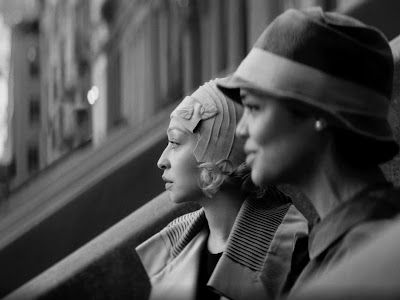Passing, the characteristically thoughtful directorial debut of the actress Rebecca Hall, is a period piece about a reunion that initiates a tragic game of hide-and-seek. The first time we see Tessa Thompson's Irene, a mixed-race woman stepping tentatively into a toy shop in Twenties New York, she's playing peekaboo beneath the rim of her hat. Here's someone who can barely bring herself to look the camera in the eye, much less the world. In a hotel tearoom across town, she crosses paths with a childhood friend, a woman approaching that world from a vastly different angle. At first, Irene barely recognises Clare (Ruth Negga), herself mixed-race: since upping sticks and resettling in Chicago, the latter has lightened her hair and skin, and started a new life by "passing" for white; in the process, she's landed a crass banker husband (Alexander Skarsgård), who has indelicate ideas about America's Black population and has stuck his better half with the worst imaginable pet name. On the surface, the ebullient Clare - dolled up like a flapper, and demonstrating the free spirit (and diction) of certain screwball heroines - appears to have solved the race problem: from the giddy manner in which she orders room service, we can tell this is a woman growing ever more accustomed to living high on the hog. Yet she's also given herself the new one of being found out; she's the period equivalent of those characters in spy thrillers whose disguise starts to come unstuck at a critical moment in the mission. "When we first married," beams Skarsgård's uxorious John, "this woman was as white as a lily. But as the years go by, she seems to be getting darker and darker." Gulp.
The source is a 1929 novel by the mixed-race author Nella Larsen, and Hall has made many smart choices within it. Having initially dazzled and destabilised us, Clare is kept offscreen for some while, the better to examine how this chance meeting impacts upon the somewhat staid upper-middle-class existence Irene retreats into back in Harlem with her loving if sexually frustrated husband Brian (André Holland), their two children, and a (pointedly dark-skinned) household staff. When Clare finally reappears on this doorstep to follow up an unanswered missive, the limitations of her chosen path are made bluntly apparent. "I want so much to be around Negroes again," she purrs, and we realise that Irene has presented as no less exotic and attractive to this exile as Clare did in turn to Irene. Hall finds neat ways of folding in other voices that provide their own commentary on this scene and this period in history: Bill Camp, the supporting actor's supporting actor, has another crafty cameo as Irene's visiting writer pal Hugh, representative of all those Caucasian tourists who flocked to Harlem in the Twenties, looking on at the Negro League meetings and thriving jazz nights like a National Geographic scribe readying a few thousand words on the discovery of a brand new tribe. (Even good liberals sometimes come at the subject of race with condescending attitudes.) Yet for the most part, the focus is on two women circling one another with a fascination that isn't quite romantic or sexual - it's more an astonishment that someone they grew up alongside could now be living a life such as this. If Hall empathises with these women, it could be because she recognises her own project's limitations - how walled-off the film, too, sometimes presents as.
Passing is now showing in selected cinemas, and is available to stream via Netflix.

No comments:
Post a Comment